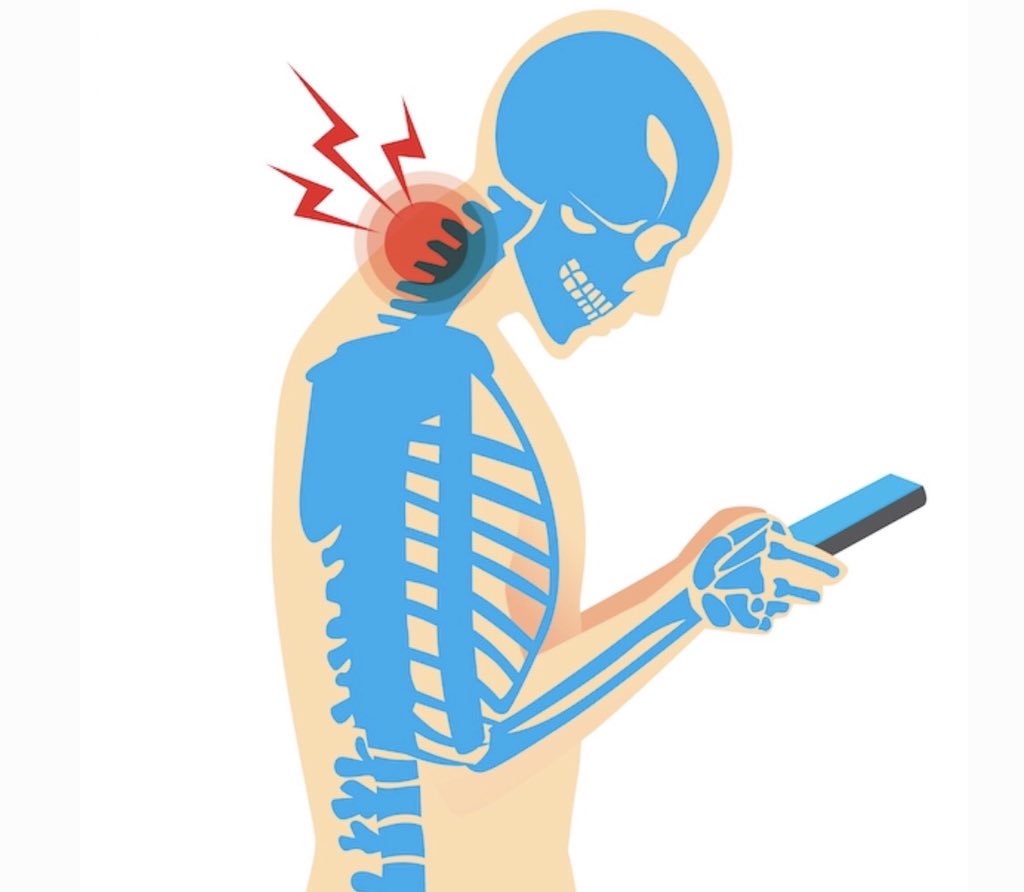Now a days wherever you see, you will see people engaged in cellphone or tablet. Using smart technology to reduce work.
Pros:
- Get updated with world news
- Stay in touch with distant friends and family
- keeps your mind busy
- less physical work
Cons:
1. More cases of headache, neck pain, back pain and knee pain
Text Neck : Due to constant bending of neck while using phone, it can cause permanat damage to cervical spine and can cause pain, numbness or weakness in arm or fingers.

Headache:
Meta-analysis Studies by Wang J.(1) showed that mobile phone/ digital item use is significantly associated with headache.
Back Pain:
In this digital world everyone work with computer more or less, People who sit constantly in front of computer, or sitting job with non proper back positioning can damage lower back spine and cause back pain and nerve root shooting pain in limbs (2).
Knee pain:
Sitting with crossed leg and lack of exercise causes damage to knee joint article which cause knee pain.
2. Increased in Sedentary lifestyle
Digitization has caused person to use of computers and laptops more and more at work, working on that has made life style more sedentary without exercise in routine work. It led to the problems such as Diabetes, Obesity and cardiovascular problems (2)
3. Depression/ Person feel lonely without it
Cell phone and internet excessive use causes addiction of it. It has increased a distant between family members. In absence of phone, person feels lonely and depress. Its more common with youth and kids. Cases of depression are increasing with increase internet/ smartphone usage. (3)
Solutions:
1. Be smart and aware: Limit use of cell phones and digital devices.
2. Exercise: Walking, household work, gardening, cooking, cleaning are good ways of exercise and use of time
3. Talk: Talk to people in your family, friends, meet in person, go to social gatherings.
4. Breaks: Give yourself frequent breaks on work, to drink water, take a small walk, take stairs , so you can get up and move around rather sitting in one place at job.
5. Proper positing while sitting: Here is the link from Harvard health for good positioning and posture
https://www.health.harvard.edu/pain/4-ways-to-turn-good-posture-into-less-back-pain
Reference:
1. Wang J, Su H, Xie W, Yu S. Mobile Phone Use and The Risk of Headache: A Systematic Review and Meta-analysis of Cross-sectional Studies. Sci Rep. 2017;7(1):12595. Published 2017 Oct 3. doi:10.1038/s41598-017-12802-9
2. Anna Citko at el, .Sedentary Lifestyle and Nonspecific Low Back Pain in Medical Personnel in North-East Poland.BioMed Research International ,Volume 2018, Article ID 1965807, 8 pages https://doi.org/10.1155/2018/1965807
3. Alhassan AA, Alqadhib EM, Taha NW, Alahmari RA, Salam M, Almutairi AF. The relationship between addiction to smartphone usage and depression among adults: a cross sectional study. BMC Psychiatry. 2018;18(1):148. Published 2018 May 25. doi:10.1186/s12888-018-1745-4
Pros:
- Get updated with world news
- Stay in touch with distant friends and family
- keeps your mind busy
- less physical work
Cons:
1. More cases of headache, neck pain, back pain and knee pain
Text Neck : Due to constant bending of neck while using phone, it can cause permanat damage to cervical spine and can cause pain, numbness or weakness in arm or fingers.

Headache:
Meta-analysis Studies by Wang J.(1) showed that mobile phone/ digital item use is significantly associated with headache.
Back Pain:
In this digital world everyone work with computer more or less, People who sit constantly in front of computer, or sitting job with non proper back positioning can damage lower back spine and cause back pain and nerve root shooting pain in limbs (2).
Knee pain:
Sitting with crossed leg and lack of exercise causes damage to knee joint article which cause knee pain.
2. Increased in Sedentary lifestyle
Digitization has caused person to use of computers and laptops more and more at work, working on that has made life style more sedentary without exercise in routine work. It led to the problems such as Diabetes, Obesity and cardiovascular problems (2)
3. Depression/ Person feel lonely without it
Cell phone and internet excessive use causes addiction of it. It has increased a distant between family members. In absence of phone, person feels lonely and depress. Its more common with youth and kids. Cases of depression are increasing with increase internet/ smartphone usage. (3)
Solutions:
1. Be smart and aware: Limit use of cell phones and digital devices.
2. Exercise: Walking, household work, gardening, cooking, cleaning are good ways of exercise and use of time
3. Talk: Talk to people in your family, friends, meet in person, go to social gatherings.
4. Breaks: Give yourself frequent breaks on work, to drink water, take a small walk, take stairs , so you can get up and move around rather sitting in one place at job.
5. Proper positing while sitting: Here is the link from Harvard health for good positioning and posture
https://www.health.harvard.edu/pain/4-ways-to-turn-good-posture-into-less-back-pain
Reference:
1. Wang J, Su H, Xie W, Yu S. Mobile Phone Use and The Risk of Headache: A Systematic Review and Meta-analysis of Cross-sectional Studies. Sci Rep. 2017;7(1):12595. Published 2017 Oct 3. doi:10.1038/s41598-017-12802-9
2. Anna Citko at el, .Sedentary Lifestyle and Nonspecific Low Back Pain in Medical Personnel in North-East Poland.BioMed Research International ,Volume 2018, Article ID 1965807, 8 pages https://doi.org/10.1155/2018/1965807
3. Alhassan AA, Alqadhib EM, Taha NW, Alahmari RA, Salam M, Almutairi AF. The relationship between addiction to smartphone usage and depression among adults: a cross sectional study. BMC Psychiatry. 2018;18(1):148. Published 2018 May 25. doi:10.1186/s12888-018-1745-4


